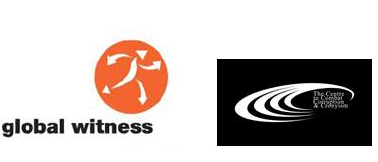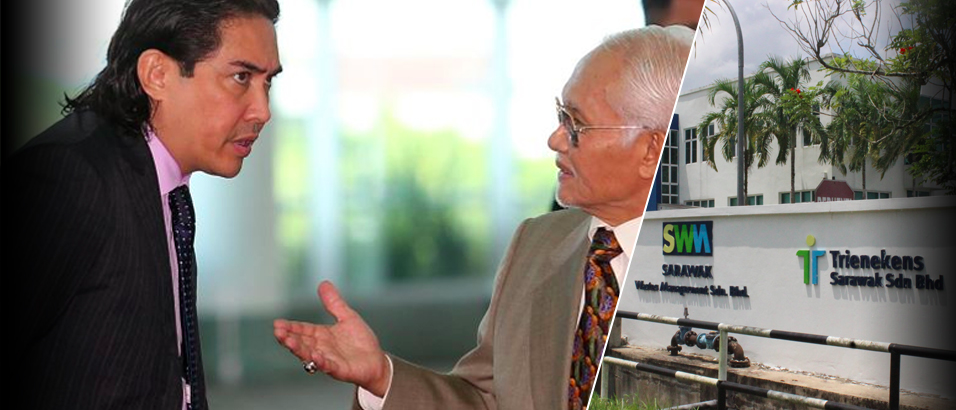
New information and documents handed to Global Witness and The Centre to Combat Corruption and Cronyism (C4) raise questions about the role of outgoing Chief Minister Abdul Taib Mahmud and his son Mahmud Abu Bekir Taib in a lucrative waste disposal agreement with a German firm. A joint venture was formed between the Sarawak Government and German waste management company Trienekens in 1998, and is still in operation. Trienekens engaged a local company – Sarawak Capital – under the ownership of Taib’s son Mahmud, to provide up to RM6.6m (US$2 million) worth of “consultancy services” as part of the deal.
A memorandum of understanding formalising the joint venture – Sarawak Wastes Management Sdn Bhd – was signed on behalf of the Sarawak Government by Hamid Bugo, State Secretary in the Chief Minister’s Department. The agreement was also signed by Taib’s son, Mahmud Abu Bekir Taib, as a witness to the deal.
“While it is standard that the State Secretary, on behalf of his boss the Chief Minister, would represent the government in such a deal, it is very unclear why the son of the Chief Minister would be witnessing a multimillion dollar agreement between the government and a foreign firm,” said Tom Picken of Global Witness. “The fact that such large fees were paid to Taib’s son’s company as part of that agreement appears to be a conflict of interest.”
Chief Minister Taib remains the subject of a graft probe by the Malaysian Anti-Corruption Commission (MACC), and is stepping down as Chief Minister on 28 February. Taib is expected to be appointed to the position of Governor immediately following this.

A consultancy agreement was drawn up between Trienekens and Sarawak Capital which required payment to Taib’s son’s firm of up to RM6.6 million for “consultancy services”. It is believed that this represented 16.5% of Trienekens’ investment in the joint venture. Under the consultancy agreement, Sarawak Capital was engaged as Trienekens’ “exclusive consultant and advisor to assist TG [Trienekens] in the achievement of its responsibilities and obligations in the JVC [joint venture company]”. Lawyers representing Chief Minister Taib stated that “the particular contract that you appear to refer to was not executed in the terms that you imply.”
Legal opinion of the consultancy agreement that Global Witness has seen is that the contract has characteristics of a ‘sham agreement’[i]. Specifically, it contains no binding contractual obligations on Sarawak Capital in its “Scope of Works”. Instead it lists a range of activities whereby Sarawak Capital only “agrees to offer” services. Furthermore, payment is tied to Trienekens’ proportion of equity in the joint venture rather than being calculated by the nature of the consultancy services (e.g. time costs, lists of personnel etc), and there are no standard termination clauses as would be found in normal consultancy agreements. The only significant binding contractual obligation in the agreement relates to payments due to Sarawak Capital from Trienekens.
“In our view, this agreement bears all the hallmarks of a thinly disguised kickback; it does not appear to commit Sarawak Capital to do anything for this money, and does not seem to make commercial sense,” said Tom Picken.
London law firm Mishcon de Reya, representing Chief Minister Abdul Taib Mahmud and Mahmud Abu Bekir Taib, told Global Witness: “the particular contract that you appear to refer to was not executed in the terms that you imply… our clients deny receiving any ‘kickback’ and/or corrupt payment, whether amounting to 16.5% of an unknown amount or otherwise… you ignore the fact that what you allege to be a 16.5% kickback was paid according to contractual project milestones. These milestones are laid out clearly in the contract… As it was, some of these milestones did not happen, and accordingly the full fee was not paid… SC was a regulated financial advisor and provided genuine commercial services to Trienekens, including conducting feasibility studies, assisting with the operations on the ground and assisting Trienekens to establish itself to its best advantage… The agreement you refer to is not a sham agreement, nor is it evidence of corruption or of “kickbacks”, whether disguised or otherwise.”
Global Witness has seen in many instances where deals of this sort oblige the foreign investor to make payments to politically connected individuals or companies, as a condition upon doing business in the country.
“There is significant public interest in this case being fully investigated by the MACC” said Cynthia Gabriel of C4. “We urge the Najib administration to delay Taib’s ascent to Governorship until the matter has been properly examined. Corruption blights the lives of all Malaysians; we need to mobilise and demand that it is rooted out of government.”
In 2005, Trienekens’ CEO, Hellmut Trienekens, was convicted of facilitating millions of euros in bribes to local officials via Switzerland to build a waste incinerator in Cologne, Germany[ii]. These payments were made in 1999, the year after the Sarawak deal was arranged.
Neither Trienekens nor Sarawak Capital responded to Global Witness’ enquiries.
Ends.
Contact:
Tom Picken (UK), Campaign Leader – Global Witness, [email protected], 44 (0)781 055 8247
Cynthia Gabriel (Malaysia), Director of C4, 6012 3792189
[i] A written agreement is a sham where it incorporates clauses which are a ‘smokescreen’ to cover the real intentions of both contracting parties i. In order to determine whether a document or transaction is a sham, regard ought to be had to all the circumstances; both before and at the time of the execution of the document or creation of the transaction ii.
i. See Sri Kelangkota-Rakan Engineering JV Sdn Bhd & Ors v Arab-Malaysian Prima Realty Sdn Bhd & Ors (2001) 1 MLJ 324 p 332; A.G. Securities v Vaughan & Ors [1990] 1 A.C. 417 and Snook v London and West Riding Investments Ltd [1967] 2 QB 786
ii. See Seascope Sdn Bhd v Syed Syed Salleh [2006] 3 MLJ 756
[ii] World Bank Group, Stolen Asset Recovery Initiative, https://star.worldbank.org/
